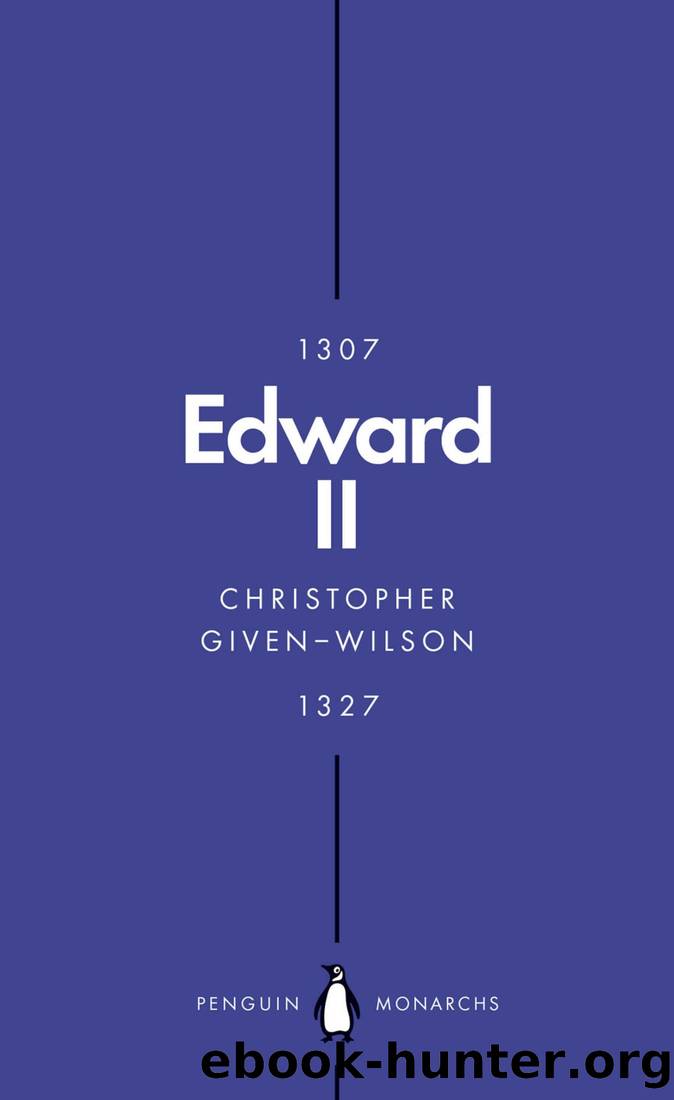Edward II (Penguin Monarchs) by Christopher Given-Wilson

Author:Christopher Given-Wilson [Given-Wilson, Christopher]
Language: eng
Format: azw3
ISBN: 9780141977973
Publisher: Penguin Books Ltd
Published: 2016-09-28T16:00:00+00:00
4
‘Make it Your Business that We Become Rich’
Edward’s triumph in 1321–2 gave him the opportunity to establish strong and responsible rule in England. Despite the return of the Despensers, there was plenty of support for the king – not just the residual loyalty and self-interest of the land- and power-holding elite, but revulsion at the excesses of the Marchers and the stiff-necked obstructionism of Lancaster and his supporters. England ached for peace, and for the first time since his accession Edward could govern on his own terms.
It was an opportunity spectacularly squandered. What followed Earl Thomas’s downfall was not sound government but a reign of terror, beginning with the purge of those who had dared to oppose the king and the Despensers. In addition to Lancaster, a further twenty-six barons, knights and esquires were condemned without trial before being drawn, hanged and quartered, the most prominent among them being John de Mowbray, Roger de Clifford, John Giffard and Bartholomew de Badlesmere. To terrorize their adherents, they were executed in their localities – York, Pontefract, Bristol, Gloucester, Windsor, Cambridge, Cardiff, Swansea, Canterbury – and their bodies or what remained of them left dangling from the gallows or ornamenting town walls for up to two years.1 A further one hundred or so were imprisoned, spared the ultimate penalty only because, like Maurice de Berkeley or the Mortimers, they had surrendered just in time. Wives, children and even parents of Contrariants were also incarcerated, and fines totalling £17,000 were imposed on their heirs or families.2 Those who were executed or imprisoned – at least 117 of them – also naturally forfeited all their lands and chattels to the king. The parliament that met at York in May 1322 confirmed these sentences, abolished the Ordinances ‘finally and forever’, and outlawed by statute any future attempt to limit the king’s freedom of action.3 Even Pembroke, upon whom Edward had relied for so long, was briefly arrested in June, on the grounds that he had wavered in August 1321 by advising the king to exile the Despensers in order to save his throne. ‘Terrified by threats and penalties’, the nobility ‘let the king’s will have free rein’. ‘O! The excessive cruelty of the king and his friends.’4
Edward’s ‘friends’ meant primarily the Despensers, who now entered upon a period of unrivalled dominance. If Gaveston had been a ‘second king’, after 1322 there were ‘three kings in England’.5 Hugh the Elder was made Earl of Winchester and granted lands worth nearly £4,000, while his son accumulated an estate valued at £7,184 a year and by 1326 had over £6,000 in cash deposited with Italian bankers. Two-thirds of his lands were in Wales, where he effectively reunited the earldom of Gloucester. He was the richest English landholder apart from the king, who supported his machinations without scruple. Widows were Despenser’s speciality. Roger Damory’s widow, Elizabeth – the king’s niece, it is worth remembering – was imprisoned and forced by legal chicanery to give up the lordship of Usk. William
Download
This site does not store any files on its server. We only index and link to content provided by other sites. Please contact the content providers to delete copyright contents if any and email us, we'll remove relevant links or contents immediately.
Blood and Oil by Bradley Hope(1253)
Daniel Holmes: A Memoir From Malta's Prison: From a cage, on a rock, in a puddle... by Daniel Holmes(1120)
Ambition and Desire: The Dangerous Life of Josephine Bonaparte by Kate Williams(1089)
Wandering in Strange Lands by Morgan Jerkins(1020)
It Was All a Lie by Stuart Stevens;(944)
What Really Happened: The Death of Hitler by Robert J. Hutchinson(875)
London in the Twentieth Century by Jerry White(850)
Time of the Magicians by Wolfram Eilenberger(846)
Twilight of the Gods by Ian W. Toll(815)
The First Conspiracy by Brad Meltzer & Josh Mensch(814)
The Japanese by Christopher Harding(804)
A Woman by Sibilla Aleramo(799)
Lenin: A Biography by Robert Service(782)
The Devil You Know by Charles M. Blow(781)
Reading for Life by Philip Davis(777)
Cleopatra by Alberto Angela(771)
Twelve Caesars by Mary Beard(771)
1965--The Most Revolutionary Year in Music by Andrew Grant Jackson(717)
The Life of William Faulkner by Carl Rollyson(716)
